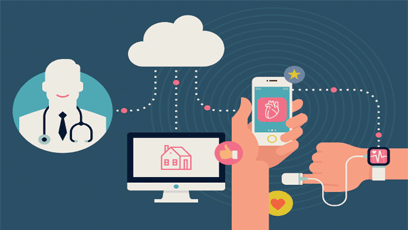IoT Opens New Avenues For Improving Healthcare Practices
The expanding interface between IoT and healthcare affords immense opportunities for enhancing patient experience, data management and outcomes. As Internet of Things(IoT)carves inroads into the healthcare sector, multisensory networks for monitoring, mapping and diagnosis enabled by IoT can reduce uncertainties and future risks while making healthcare more affordable, patient friendly and effective.
Personalized Treatment and Care
Personalizing healthcare has been a holy grail for healthcare institutions. Data gathered from an IoT installation in a treatment facility can be used to deliver personalized patient experience and in preparing customized and targeted solutions designed to meet the unique needs of individual patients. These covers all levels of diagnosis, monitoring and services including exercise advice and/or dietary inputs. The doctor can study an IoT stream coming from devices accessed via a portal to study the health of the patient. This data stream also helps in deriving the efficacy of drugs and dosage being administered while providing information on the side effects, if any.
Dosage Adherence
A study by the World Health Organization found that as much as 50 percent of medicines are not taken as directed by patients. Non adherence to the prescribed drug dosage is dangerous and could result in loss of life, reduce treatment
impact and losses to the industry as a whole. It could also place a financial strain on government healthcare streams. By means of a unique sensor embedded bottles that could inform patients, doctors or family members in case a patient has taken excess dosage or less than the prescribed dosage, adherence to medication can be monitored.

Patient Safety and Privacy
Remote health management enables patients to stay in their homes during the period of observation/ treatment. Tele health provides alerts and informs doctors if any parameter of importance goes above or below the prescribed threshold. Doctors can be consulted through teleconference or even tele presence bots. Data sets stored on the cloud enable historical patient data to be accessed by a physician to better diagnose a medical condition.
Evidence based decision making can be enabled by creating a pool of patient information. Which might include offline records as well as consultation information, genome records and clinical research data. This will go a long way in contextualizing healthcare services. For improving patient privacy, the relationship between IoT and pharma needs to be strengthened. With this, IoT enabled treatment strategies, patient interaction and data management models can be evolved. These are but a few instances

of IoT playing a significant role in transforming traditional healthcare practices. With the deployment of more smart devices, there is a huge opportunity waiting to be tapped. Through improved preemptive diagnosis and enhanced patient experience, IoT opens doors for newer healthcare models to be operationalized. This will reduce costs and improve the availability of better healthcare options for the masses.
Patient Safety and Privacy
Remote health management enables patients to stay in their homes during the period of observation/ treatment. Tele health provides alerts and informs doctors if any parameter of importance goes above or below the prescribed threshold. Doctors can be consulted through teleconference or even tele presence bots. Data sets stored on the cloud enable historical patient data to be accessed by a physician to better diagnose a medical condition.
Remote health management enables patients to stay in their homes during the period of observation/ treatment
Evidence based decision making can be enabled by creating a pool of patient information. Which might include offline records as well as consultation information, genome records and clinical research data. This will go a long way in contextualizing healthcare services. For improving patient privacy, the relationship between IoT and pharma needs to be strengthened. With this, IoT enabled treatment strategies, patient interaction and data management models can be evolved. These are but a few instances
of IoT playing a significant role in transforming traditional healthcare practices. With the deployment of more smart devices, there is a huge opportunity waiting to be tapped. Through improved preemptive diagnosis and enhanced patient experience, IoT opens doors for newer healthcare models to be operationalized. This will reduce costs and improve the availability of better healthcare options for the masses.
